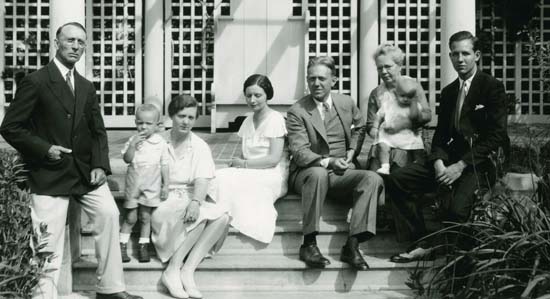 |
 |
| current issue |  | past issues |  | send a letter/news |  | address update |  | advertise |  | about us |  | alumni home |
Web Extras
The Kind of Man He WasPage 2 of 3
Although he'd had little experience with baseball, it reminded Lewis of a game he'd enjoyed playing in the pastures of Wales, called Duck on a Rock, in which players throw small stones at a larger stone in an attempt to knock it off a big rock. A coach at Marrietta discovered Lewis's innate pitching ability and trained him during his freshman year. At the end of that year, Lewis had won 10 out of 12 games—as well as an oratory contest.
Back in Utica for the summer, he played for the local professional team, the Genesees. His girlfriend, Margaret Williams, whom he had met in Sunday school at a Welsh church, faithfully attended every game, often instigating her own cheering section, and Lewis typically escorted her to the stands before the game began. One day, however, she was late. Here's how Van Allen's uncle, John Lewis, describes the incident:
"Play Ball!" the umpire yelled, and the game began—without the arrival of Miss Williams. After Ted had taken the mound and pitched several times to the first batter, he suddenly noticed his young lady-love, desperately waving her parasol and nudging the gate with her high-button shoes. Without calling time, he dropped the ball and walked off the diamond.
Dead silence electrified the crowd, players and umpire. Not a soul moved. Yet, all the eyes glazed in wonder as he calmly walked to the gate. But, when he doffed his cap and took Maggie's arm, instant pandemonium broke loose: a tumultuous, standing ovation—accompanied by honking horns, banging pans and whistles—greeted him, as he hustled back to the mound, to resume trouncing the local club.
Friends later said: "Ted's gallantry—that day—won Margaret's heart for good."
Lewis' talent as a pitcher did not go unnoticed, and in the fall he began his sophomore year at Williams College in Massachusetts on an athletic scholarship. There he excelled in many ways. He was named one of the top college pitchers in the country his first year and during his last two years won 14 of the 16 games he pitched in the Triangular League (Williams, Amherst and Dartmouth). Having become quite popular at the elite school, despite his background of poverty and immigration, he was not only first in his class but also president of the class when he graduated in 1896. He married Margaret three days later—dressed in the uniform of the Boston Beaneaters, ready to embark on his major-league career.
Lewis became known as "Parson" Lewis among his teammates not only for his refusal to play on Sundays, but also because of his studious and religious nature. He always had a backpack of books with him, and he often took his teammates—including Cy Young, who had no religious training according to Van Allen—to church with him. In fact, his victory over the Louisville, Ky., team in his very first game, his son writes, earned him this description in the local paper: "Mr. Lewis ... transformed nine big strong men into monkeys before the eyes of the multitude. The Kentucky Colonels were as disconcerted as the builders of the Tower of Babel—they knew not what to do. Yet in spite of this, they say Lewis is studying for the ministry. This is what he did and then claims to be a Christian."

|
A devoted baseball fan herself, Van Allen is proud of her grandfather'saccomplishments on the baseball diamond, but she especially cherishes the anecdotes that reveal his character, whether on the field or off. One time, for example, he brought a ball game to a halt in order to interrupt his team's merciless heckling of a rookie pitcher on the opposing team. Lewis, who remembered being heckled for nine innings straight in one game at the start of his career, John Lewis writes, marched out onto the mound and "advised the startled and timid young man to straighten up his backbone and ... disregard the static coming his way." Upon being escorted back to the bench by an umpire, Lewis received "an ice-cold reception" from his Boston teammates, but they never again heckled a rookie pitcher "with the same nastiness."
Lewis helped the Beaneaters (later known as the Braves) win two of the team's seven pennants during the 1890s, and in 1898, he led the National League in percentage wins, with a record of 26-8. In 1901, he played on the very first Red Sox team, and during that season—his last—he pitched the team's first shutout. Then, having earned his master's in elocution from Williams two years earlier in anticipation of a career in academia or the ministry, he decided to teach at the college level.
Lewis' baseball career ended in "a blaze of glory," writes his son. "At the end of the game [a 3-2 win over the pennant holders, Chicago] in front of two standing ovations, he walked to the stands and kissed his wife. That fall he became an instructor of rhetoric at Columbia, a far, far cry compared to the roar of the fans and the crack of the well-swung bat. The period Ted played in the National League contained many players who eventually made the Baseball Hall of Fame ... but only one great pitcher from Boston in baseball history became president of two universities—Parson Lewis."
After a brief stint at Columbia, Lewis taught at Williams, and then the Massachusetts Agricultural College in Amherst, where he taught literature, primarily poetry, and served in a number of roles from dean to president. He also made two unsuccessful bids for a Congressional seat during this period.
Page: < Previous 1 2 3 Next >
Easy to print version

